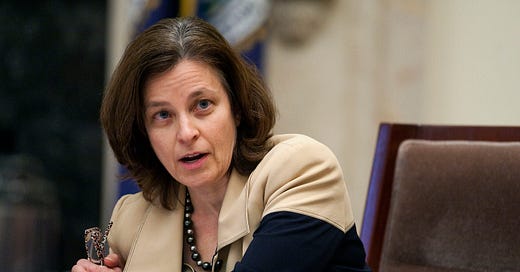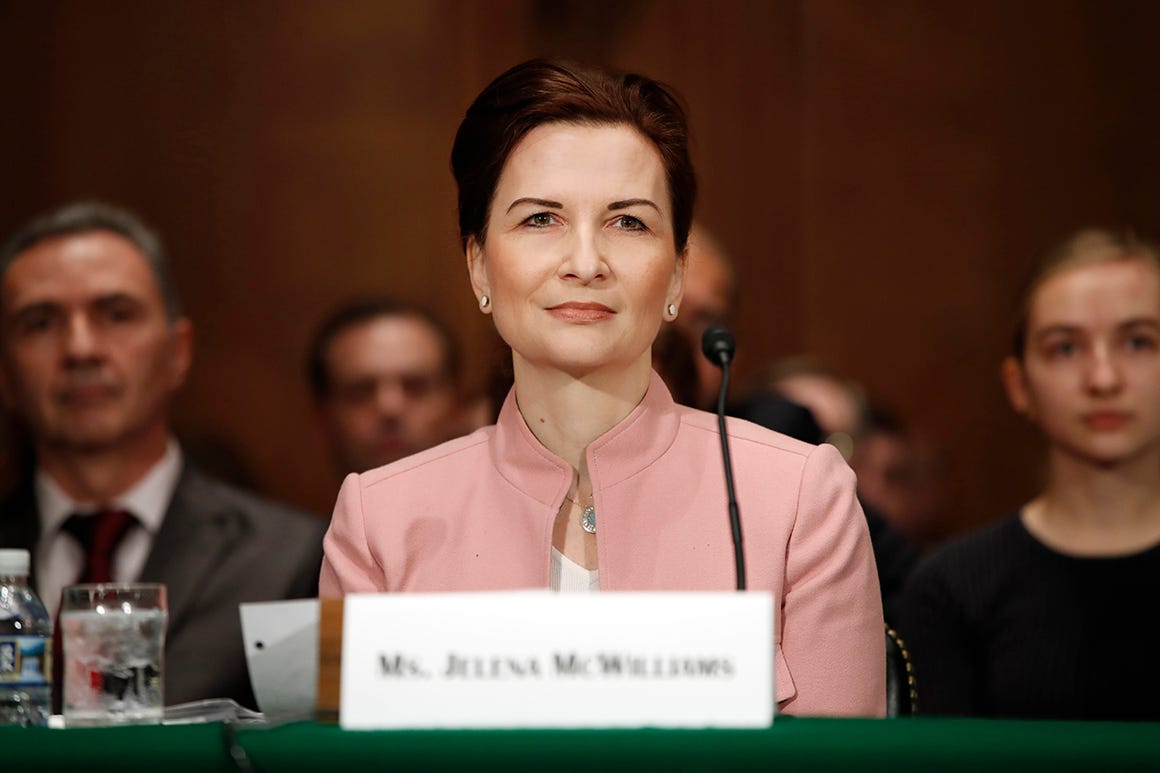Briefing: Sarah Bloom Raskin coming in, Jelena McWilliams going out
A deep dive into the Fed's role in addressing climate change and other climate finance developments
On Friday, President Biden announced his remaining nominees for vacancies on the Federal Reserve’s Board of Governors. If confirmed, this slate will comprise the most diverse Fed ever. Lisa Cook, a noted expert on racial economic disparities, will become the first Black woman to serve on the Fed Board in history. The nomination of Sarah Bloom Raskin to Vice Chair for Supervision (the top regulatory position at the Fed) is especially welcome news for the climate. Raskin is a hero to many progressives, and she is well-known for visiting job fairs undercover during the Great Recession, making a key post-2008 crisis Wall Street rule stronger by issuing the first regulatory dissent in the central bank’s history, and taking on predatory lenders as Maryland’s banking regulator.
Because of this experience, she is well-positioned to reverse the damage that outgoing Vice Chair for Supervision Randy Quarles did as the first confirmed person to serve in this role. (Quarles weakened numerous financial protections and helped accelerate the financial industry consolidation that has been the hallmark of his career. But even with this deregulatory streak, Quarles joined central bankers around the world in acknowledging the importance of understanding climate risk.)
Raskin is a leading thinker on climate risk, and so will be an excellent person to help shape the climate risk supervision framework that the Fed is in the process of developing. Her speech on “climate change and the precautionary imperative” at the Bank for International Settlements’ Green Swan Conference last June is worth watching in its entirety. In the speech, Raskin compared the American government’s failure to properly prepare for climate change to the inadequate preparations that were made to respond to a pandemic. She also reviewed the extensive history of regulators taking a failed “wait and see” approach to threats bubbling up in the financial system, and argued forcefully and persuasively for a precautionary approach to climate risk, concluding:
Climate change has put the financial system on a difficult path: Looming climate catastrophe on one side, and the economic transformation required to fend it off on the other, such that grave harm from one or the other is nearly certain, at least in the absence of careful management by financial regulators. This careful management is a task that is necessary now-- not when catastrophe has already occurred. Market forces are now in play that are moving the economy to one less dangerous to our well-being, one that is better for us, that produces durable benefits in terms of health, economic well-being, and inclusive prosperity. These market forces need a precautionary and selective amplification from central banks and the financial market and prudential regulatory agencies.
The Fed’s role in addressing climate risk took center stage over the last week, as the Senate Banking Committee held confirmation hearings for Jerome Powell and Lael Brainard, Biden’s nominees for Fed Chair and Vice Chair. Powell and Brainard were encouraged to act on climate by Senate Banking Chair Sherrod Brown and Senator Elizabeth Warren, who pointed to the consensus that climate change poses a threat to the stability of the financial system. Over the last several years, Powell often deferred to Quarles and seems inclined to let the Vice Chair for Supervision take the lead on regulatory matters. But the Chair is ultimately the leader of the institution, and Brown secured Powell’s commitment that climate change would be a priority for him, not just for Raskin.
Meanwhile, the Committee’s top Republican, Pat Toomey, came out swinging against the Fed even conducting research into the topic of climate change, which he called “politically charged.” In his opening statement during Powell’s hearing, Toomey derided the mission of the Network for Greening the Financial System (NGFS), an international consortium of central banks that the Fed only joined weeks after Biden was elected. Toomey suggested that the NGFS is politicized because its stated mission is “to use financial regulation to mobilize mainstream finance to support the transition toward a sustainable economy.” According to Toomey, the NGFS’ purpose of aligning financial regulation with the pollution reduction necessary to keep the human species alive is inappropriately political because it might “direct credit away from the fossil fuel sector.”
Toomey’s statements are strongly reminiscent of a scene in the film Don’t Look Up when White House staffers weigh the economic benefits of an extinction-level comet hurtling toward Earth. Under Toomey’s formulation, scientists use data to determine which activities pose a threat to human survival, economists use data to calculate which assets might make money, and the two must never speak to one another, lest scientists identify any economic downsides to making the planet less inhabitable. Moreover, given that many experts have noted that climate risk at the moment has “echoes” of the housing market just prior to the 2008 financial crash, Toomey’s position that the Fed must ignore climate change would be a bit like telling former Fed Chair Ben Bernanke at his 2005 confirmation hearing that the Fed should not care about subprime mortgages.
While Brainard and Powell both seemed to view climate change as squarely within the Fed’s mission of ensuring financial stability, neither one pushed back against Toomey’s insistence that climate is irrelevant to the Fed’s monetary policy mandate of maximum employment and price stability. Brainard, however, has recognized in the past that climate is relevant to monetary policy, noting for example that “as the frequency of heat waves increases, research indicates there could be important effects on output and labor productivity.” (In other words, it is difficult to sustain maximum employment on a burning planet and challenging to have stable prices when drought and heat waves are threatening crop yields.) In his questions of Powell, Montana Senator Jon Tester encouraged the Fed to work on climate, noting the record year of costly climate disasters the US has just experienced and mounting crop insurance costs that farmers in his state are facing.
When grilled by Montana’s Republican senator, Steve Daines, over whether the Fed had the authority and expertise to understand climate risk, Brainard made the apt point that the Fed’s staff has few experts on disease, but must understand the implications of public health research because of the economic shock that pandemics cause. In another moment fit for Don’t Look Up, Daines responded by musing about the economic shock caused by the 1973 oil embargo, seemingly implying that higher oil prices are a bigger economic concern than civilizational collapse.
Another welcome climate finance development is the announced resignation of FDIC Chair Jelena McWilliams. A Trump holdover, McWilliams had previously expressed her intention to serve until the expiration of her term in 2023, but resigned effective in February after being outvoted by her fellow board members on a recent action. Incredibly, McWilliams—who had refused to affirm Joe Biden as the winner of the 2020 presidential election in an exchange with Rep. Emanuel Cleaver (D-MO)—took to the pages of the Wall Street Journal to assert her bizarre legal theory that the FDIC operates solely at the discretion of the chair, and decry a decision made by a majority of FDIC board members as a threat to democracy. Eventually, McWilliams relented.
This is good news in general for the safety and stability of the financial system. McWilliams was trying to block an attempt aimed at strengthening the FDIC’s oversight of pending bank mergers, and she had previously chosen March 2020 of all moments to announce that the FDIC would allow certain companies to operate banks without being regulated like banks. But this is also great news for the climate. When the Financial Stability Oversight Council (FSOC) approved a new report on climate as a risk to financial stability in October, McWilliams was the only voting FSOC member to abstain.
With McWilliams out of the way, the FDIC can join the other US’ other top banking regulators in becoming a part of the NGFS, and can move forward with developing an approach to climate risk supervision, just as the OCC recently has. Evaluating and acting on climate as a financial stability risk, and monitoring the impact of the “shadow banking” sector on climate change are top priorities for the new regulators who now comprise the FSOC. Replacing McWilliams as one of the actors shaping this new approach is a needed step.






